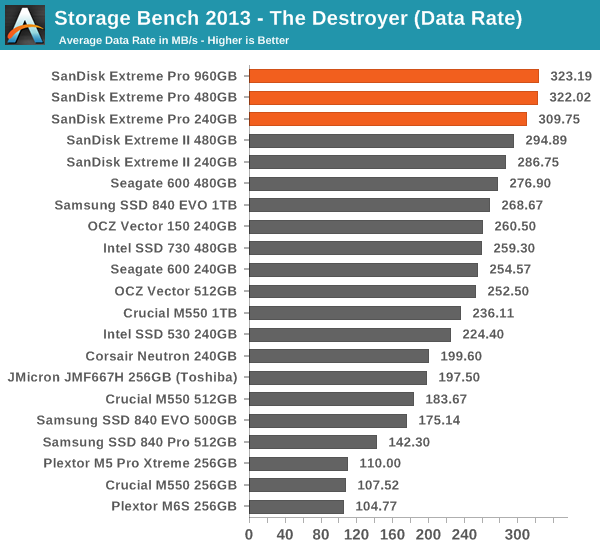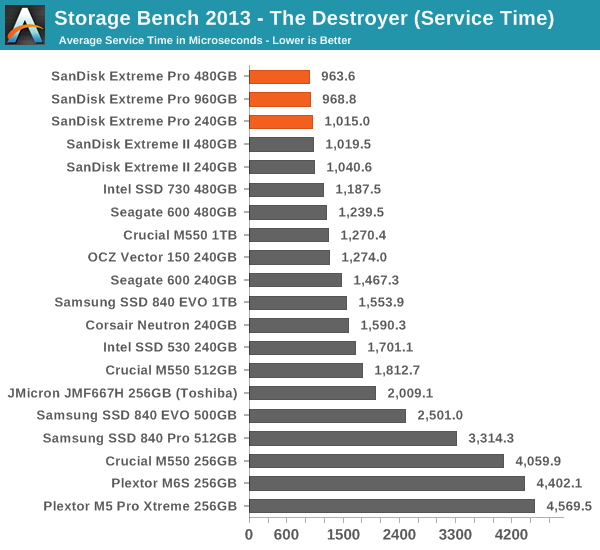SanDisk Extreme Pro SSD (240GB, 480GB & 960GB) Review: The Fastest Just Got Faster
by Kristian Vättö on June 16, 2014 4:00 PM EST- Posted in
- Storage
- SSDs
- SanDisk
- Extreme Pro
AnandTech Storage Bench 2013
Our Storage Bench 2013 focuses on worst-case multitasking and IO consistency. Similar to our earlier Storage Benches, the test is still application trace based - we record all IO requests made to a test system and play them back on the drive we are testing and run statistical analysis on the drive's responses. There are 49.8 million IO operations in total with 1583.0GB of reads and 875.6GB of writes. I'm not including the full description of the test for better readability, so make sure to read our Storage Bench 2013 introduction for the full details.
| AnandTech Storage Bench 2013 - The Destroyer | ||
| Workload | Description | Applications Used |
| Photo Sync/Editing | Import images, edit, export | Adobe Photoshop CS6, Adobe Lightroom 4, Dropbox |
| Gaming | Download/install games, play games | Steam, Deus Ex, Skyrim, Starcraft 2, BioShock Infinite |
| Virtualization | Run/manage VM, use general apps inside VM | VirtualBox |
| General Productivity | Browse the web, manage local email, copy files, encrypt/decrypt files, backup system, download content, virus/malware scan | Chrome, IE10, Outlook, Windows 8, AxCrypt, uTorrent, AdAware |
| Video Playback | Copy and watch movies | Windows 8 |
| Application Development | Compile projects, check out code, download code samples | Visual Studio 2012 |
We are reporting two primary metrics with the Destroyer: average data rate in MB/s and average service time in microseconds. The former gives you an idea of the throughput of the drive during the time that it was running the test workload. This can be a very good indication of overall performance. What average data rate doesn't do a good job of is taking into account response time of very bursty (read: high queue depth) IO. By reporting average service time we heavily weigh latency for queued IOs. You'll note that this is a metric we have been reporting in our enterprise benchmarks for a while now. With the client tests maturing, the time was right for a little convergence.

Given that the Extreme II was already dominating the Storage Bench 2013, it doesn't come as a surprise that the Extreme Pro is the new crownholder. Even the SSD 730 and Vector 150 can't challenge the Extreme Pro despite the fact that in terms of pure random write performance they are better. I think SanDisk's strength lies in mixed read/write performance because write performance alone does not yield good results in real world workloads, which tend to be a mix of reads and writes.
In fact, client workloads (like our Storage Benches) are usually more read-centric anyway and in the case of the Extreme Pro, the drive spent over three times longer processing read IOs than write IOs, which makes sense because there are nearly four times more read IOs than there are write IOs in the trace (even though in terms of gigabytes the difference is only twofold).











85 Comments
View All Comments
Highlanderix - Thursday, June 26, 2014 - link
Well, I don't understand very well how or why the SanDisk Extreme Pro and SanDisk Extreme II finish in front in AnandTech Storage Bench 2013 when it seemed to me that Samsung 840 Pro outperforms the SanDisk Extreme II by some distance (according to other websites) in terms of 4K write I/O operations. I saw 90K against 30K for the SanDisk in one test and 90K against 60K in another.Is it the mix of both types of operation (read/write) that makes the difference or is the AnandTech Storage Bench 2013 using more intensively non-4K read/write operations where perhaps the SanDisk SSDs perform better ? And would it be possible to have some results for the Samsung 840 Pro 256Gb in AnandTech Storage Bench 2013 please if the SSD is still available for testing ? :) Thanks :)
Highlanderix - Thursday, June 26, 2014 - link
And finally, I hesitate between the SanDisk Extreme Pro 256Gb (150€ here in France) and the Samsung 840 Pro 256Gb (165€). 10 year warranty sound really good but which one is better in terms of pure performance ? Which one should I take ?Phreedom1 - Sunday, June 29, 2014 - link
I don't understand. In this review it says that the Sandisk Extreme Pro is the fastest SSD available yet when you go to the "Bench" area of this website, pick the Extreme Pro and put it up against something like the Samsung 840 Pro, the Samsung wins in many of the benchmarks. Even when put up against the Sandisk Extreme II the newer Extremem Pro loses out in many of the marks. I'm just looking for the all around fastest 240/256GB SSD but it seems every site I go to has a different opinion.himem.sys - Monday, June 30, 2014 - link
Some people complain about real-world difference between ssd drives (because drives are fast enough). Nah, thay arent :). I can tell that my 240GB hyperx is better than most 7k rpm drives, but its a turtle wgen compared to ramdrive. I cutted off 25GB partition from 32Gb of total memory to do some special things and i see huge difference. Installation a windows 2012 r2 with sql 2012 on hyper-v? Its a matter of minutes (i7 3770 @ 4.1). Benchmarks? Who needs them when you have powershell [get-counter -Counter '\process(_total)\io data operations/sec']. I used ramdrives on dell r820 filled with ram and can tell this: the slowest part of pc/server is and will be cpu :).Tornadotuan - Friday, July 8, 2016 - link
Hi Hardware Community,I know this article is quite outdated right now, nevertheless the actual topic of the authors "Final Words" bug me right now. Especially now that enough time for longtime-endurance tests has passed.
Anyway, I can´t choose between the Samsung EVO 850 1TB v2 (289€) and die SanDisk Extreme 960GB (281€).
So pricewise the "Pro" is even cheaper right now compared to the Samsung. But there are some obvious differences:
- TLC 3D V-NAND vs. MLC Planar
- 5 years vs. 10 years warranty
- 150 TBW vs. 80 TBW
- higher Peak vs. consistency
- Samsung Bugging vs. sudden death drives
My usage:
- Client for everything: gaming, programming, office, multimedia - averything
- gonna split it in system and data-partition
- gonne be in laptop that´s used as desktop
- battery is wasted, so no concern about power consumption
So, usually I use hardware until it´s broken so meaning about 8-10 years.
Still I want steady performance without sudden decline in speed like with the EVO 840 :C
I´d be really glad, if you could tell me your opinion on this :)